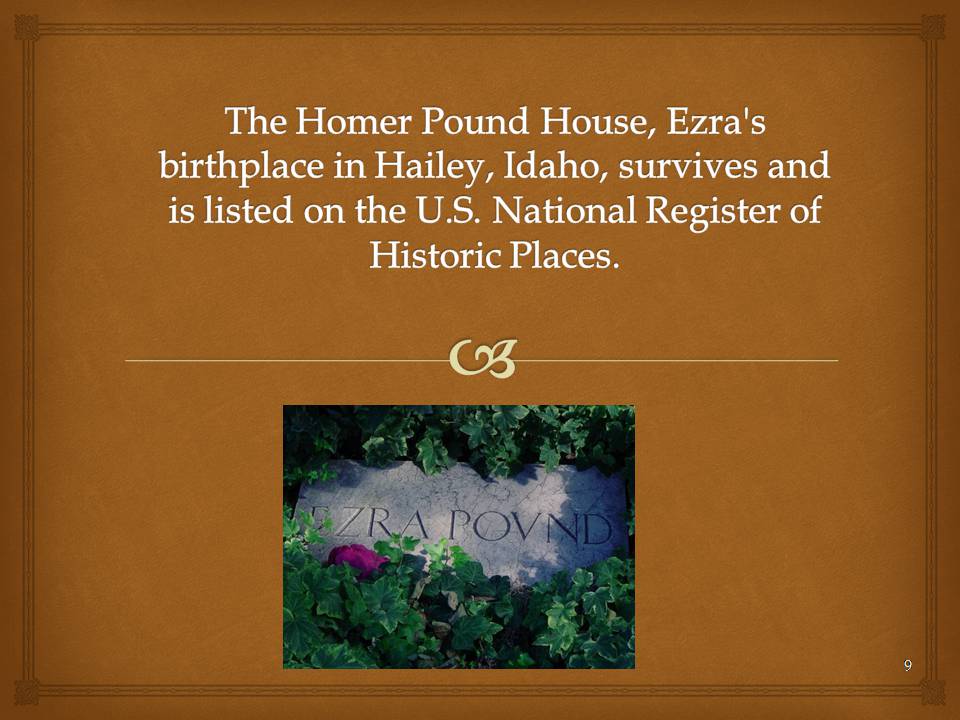- Головна
- Готові шкільні презентації
- Презентація на тему «Ezra Pound»
Презентація на тему «Ezra Pound»
245
Слайд #1
1
Ezra Pound
Ezra Pound
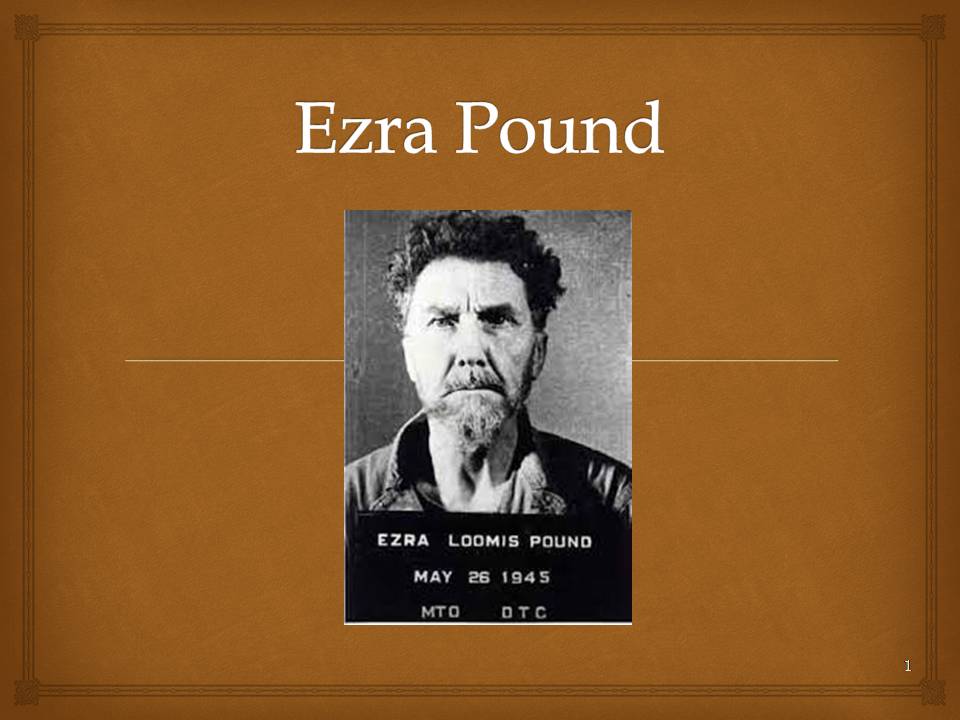
Слайд #2
2
Ezra Weston Loomis Pound (30 October 1885 – 1 November 1972) was an American expatriate poet and critic of the early modernist movement. His contribution to poetry began with his promotion of Imagism, a movement that called for a return to more Classical values, stressing clarity, precision and economy of language, and had an interest in verse forms such as the Japanese Haikus. His best-known works include Ripostes (1912), Hugh Selwyn Mauberley (1920) and his unfinished 120-section epic, The Cantos (1917–1969).
Ezra Weston Loomis Pound (30 October 1885 – 1 November 1972) was an American expatriate poet and critic of the early modernist movement. His contribution to poetry began with his promotion of Imagism, a movement that called for a return to more Classical values, stressing clarity, precision and economy of language, and had an interest in verse forms such as the Japanese Haikus. His best-known works include Ripostes (1912), Hugh Selwyn Mauberley (1920) and his unfinished 120-section epic, The Cantos (1917–1969).
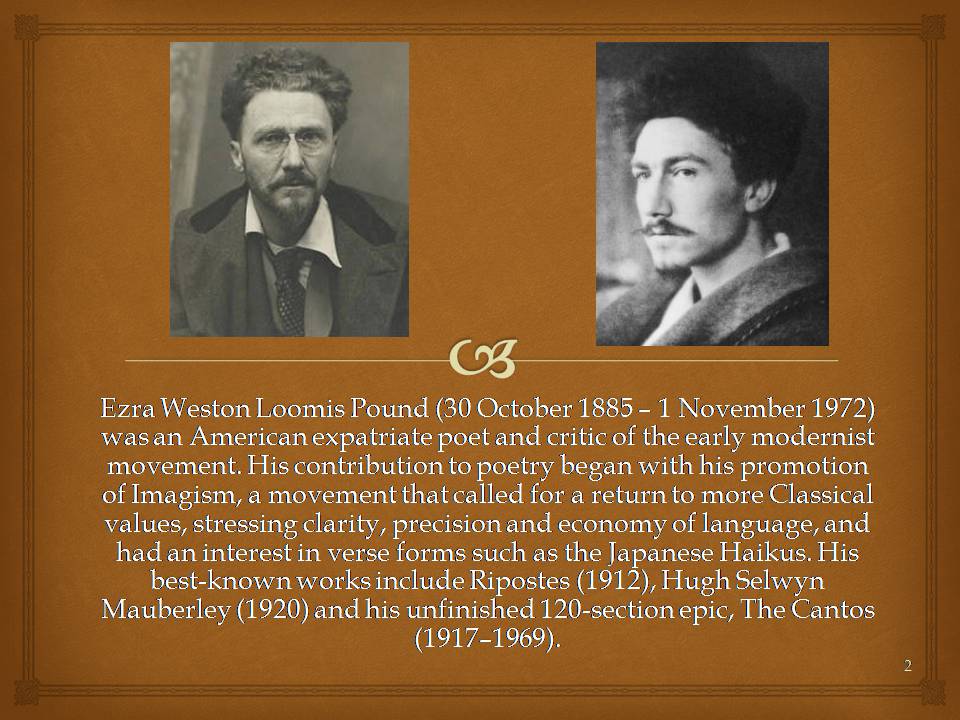
Слайд #3
3
Early life (1885–1908)
Background
Pound was born in Hailey, Idaho Territory, the only child of Homer Loomis Pound (1858–1942) and Isabel Weston (1860–1948). Both parents' ancestors had emigrated from England in the 17th century. On his father's side, John Pound, a Quaker, sailed from England around 1650. His grandfather, Thaddeus Coleman Pound (1832–1914), was a retired Republican Congressman for north-west Wisconsin who had made and lost a fortune in the lumber business. His son Homer, Pound's father, had worked for Thaddeus until Thaddeus secured him an appointment as Register of the Government Land Office in Hailey.
On his mother's side, Pound was descended from William Wadsworth, a Puritan who emigrated from England to Boston on the Lyon in 1632.[6] The Wadsworths married into the Westons of New York, and Harding Weston and Mary Parker had Isabel Weston, Pound's mother. Harding apparently spent most of his life without work, so his brother, Ezra Weston and his wife, Frances, looked after Mary and Isabel's needs.
Isabel was unhappy living in Hailey, and when her son was 18 months old she left with him to go back East. Homer followed them, and in 1889 took a job as an assayer at the Philadelphia Mint. The family moved to 417 Walnut Street in Jenkintown, Pennsylvania, then in July 1893 bought a six-bedroom house at 166 Fernbrook Avenue in the town of Wyncote, Pennsylvania.
Early life (1885–1908)
Background
Pound was born in Hailey, Idaho Territory, the only child of Homer Loomis Pound (1858–1942) and Isabel Weston (1860–1948). Both parents' ancestors had emigrated from England in the 17th century. On his father's side, John Pound, a Quaker, sailed from England around 1650. His grandfather, Thaddeus Coleman Pound (1832–1914), was a retired Republican Congressman for north-west Wisconsin who had made and lost a fortune in the lumber business. His son Homer, Pound's father, had worked for Thaddeus until Thaddeus secured him an appointment as Register of the Government Land Office in Hailey.
On his mother's side, Pound was descended from William Wadsworth, a Puritan who emigrated from England to Boston on the Lyon in 1632.[6] The Wadsworths married into the Westons of New York, and Harding Weston and Mary Parker had Isabel Weston, Pound's mother. Harding apparently spent most of his life without work, so his brother, Ezra Weston and his wife, Frances, looked after Mary and Isabel's needs.
Isabel was unhappy living in Hailey, and when her son was 18 months old she left with him to go back East. Homer followed them, and in 1889 took a job as an assayer at the Philadelphia Mint. The family moved to 417 Walnut Street in Jenkintown, Pennsylvania, then in July 1893 bought a six-bedroom house at 166 Fernbrook Avenue in the town of Wyncote, Pennsylvania.
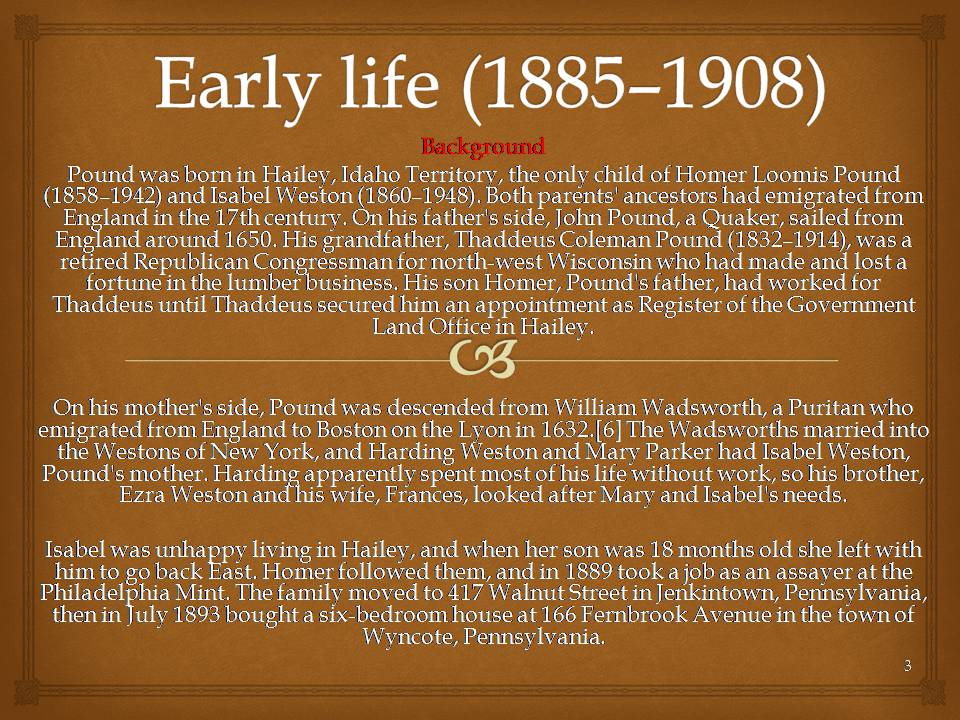
Слайд #4
4
Thaddeus Pound, Pound's grandfather, in the late 1880s
With his mother in 1898
Thaddeus Pound, Pound's grandfather, in the late 1880s
With his mother in 1898
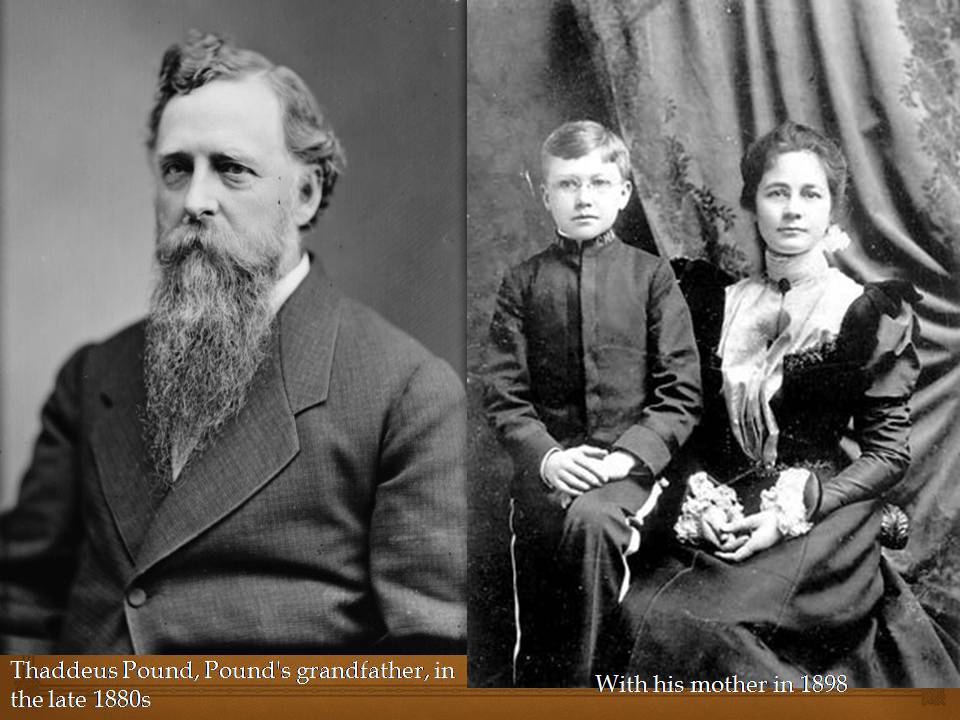
Слайд #5
5
Education
Pound's early education took place in a series of so-called dame schools, some of them run by Quakers: Miss Elliott's school in Jenkintown in 1892; the Misses Heacock's Chelten Hills school in Wyncote in 1893; and the Florence Ridpath school from 1894, which became the Wyncote Public School a year later. From 1898 until 1900 he attended the Cheltenham Military Academy, where the boys wore Civil War-style uniforms and were taught military drilling, how to shoot, and the importance of submitting to authority. Pound was clever, independent-minded, conceited, and unpopular. He knew early on that he wanted to be a poet.
His first publication was on 7 November 1896 in the Jenkintown Times-Chronicle, a limerick about American politician William Jennings Bryan, who had just lost the presidential election: By E.L. Pound, Wyncote, Aged 11 years: "There was a young man from the West, / He did what he could for what he thought best."
Pound's first trip overseas came two years later when he was 13, a three-month tour of Europe with his mother and Aunt Frances, who took him to England, Belgium, Germany, Switzerland, and Italy. He was admitted to the University of Pennsylvania's College of Liberal Arts in 1901 at the age of 15.
Education
Pound's early education took place in a series of so-called dame schools, some of them run by Quakers: Miss Elliott's school in Jenkintown in 1892; the Misses Heacock's Chelten Hills school in Wyncote in 1893; and the Florence Ridpath school from 1894, which became the Wyncote Public School a year later. From 1898 until 1900 he attended the Cheltenham Military Academy, where the boys wore Civil War-style uniforms and were taught military drilling, how to shoot, and the importance of submitting to authority. Pound was clever, independent-minded, conceited, and unpopular. He knew early on that he wanted to be a poet.
His first publication was on 7 November 1896 in the Jenkintown Times-Chronicle, a limerick about American politician William Jennings Bryan, who had just lost the presidential election: By E.L. Pound, Wyncote, Aged 11 years: "There was a young man from the West, / He did what he could for what he thought best."
Pound's first trip overseas came two years later when he was 13, a three-month tour of Europe with his mother and Aunt Frances, who took him to England, Belgium, Germany, Switzerland, and Italy. He was admitted to the University of Pennsylvania's College of Liberal Arts in 1901 at the age of 15.
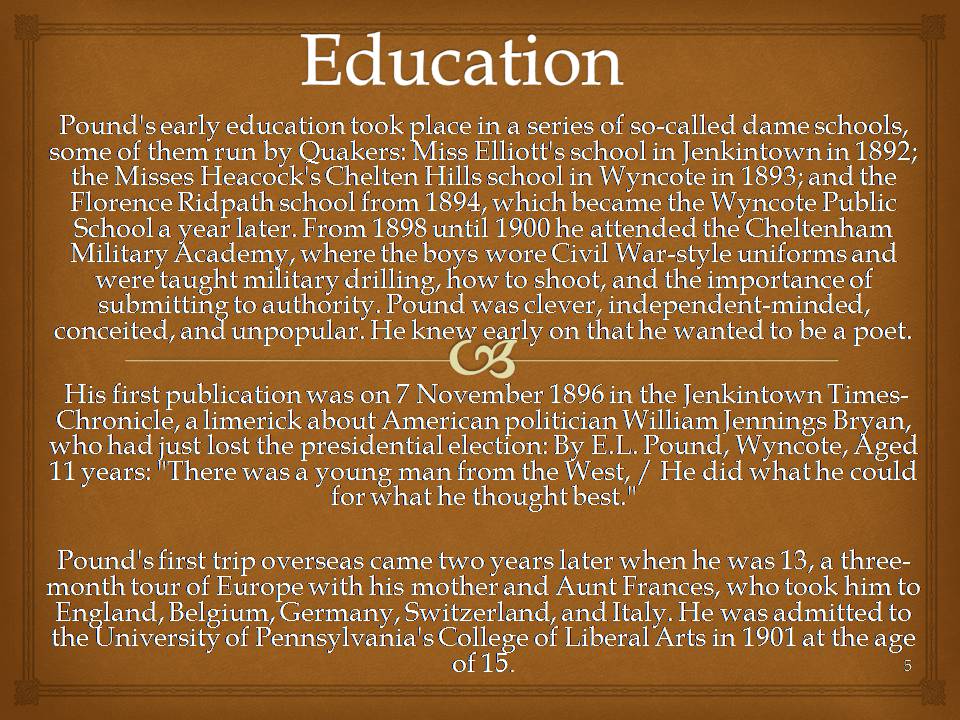
Слайд #6
6
Teaching
In the fall of 1907 he took a job as a teacher of Romance languages at Wabash College in Crawfordsville, Indiana, a conservative town that he called the sixth circle of hell, with an equally conservative college from which he was dismissed after deliberately provoking the college authorities.
Smoking was forbidden, so he would smoke cigarillos in his office down the corridor from the President's. He annoyed his landlords by entertaining friends, including women, and was forced to move from one house after "[t]wo stewdents found me sharing my meagre repast with a lady gent impersonator in my privut apartments," as he told a friend. He was eventually caught in flagrante, although the details remain unclear and he denied any wrongdoing. The incident involved a stranded chorus girl to whom he offered tea and his bed for the night when she was caught in a snowstorm; discovered the next morning by the landladies, Misses Ida and Belle Hall, his insistence that he had slept on the floor was met with disbelief, and he was asked to leave the college. Glad to be free of the place, he left for Europe soon after.
Teaching
In the fall of 1907 he took a job as a teacher of Romance languages at Wabash College in Crawfordsville, Indiana, a conservative town that he called the sixth circle of hell, with an equally conservative college from which he was dismissed after deliberately provoking the college authorities.
Smoking was forbidden, so he would smoke cigarillos in his office down the corridor from the President's. He annoyed his landlords by entertaining friends, including women, and was forced to move from one house after "[t]wo stewdents found me sharing my meagre repast with a lady gent impersonator in my privut apartments," as he told a friend. He was eventually caught in flagrante, although the details remain unclear and he denied any wrongdoing. The incident involved a stranded chorus girl to whom he offered tea and his bed for the night when she was caught in a snowstorm; discovered the next morning by the landladies, Misses Ida and Belle Hall, his insistence that he had slept on the floor was met with disbelief, and he was asked to leave the college. Glad to be free of the place, he left for Europe soon after.
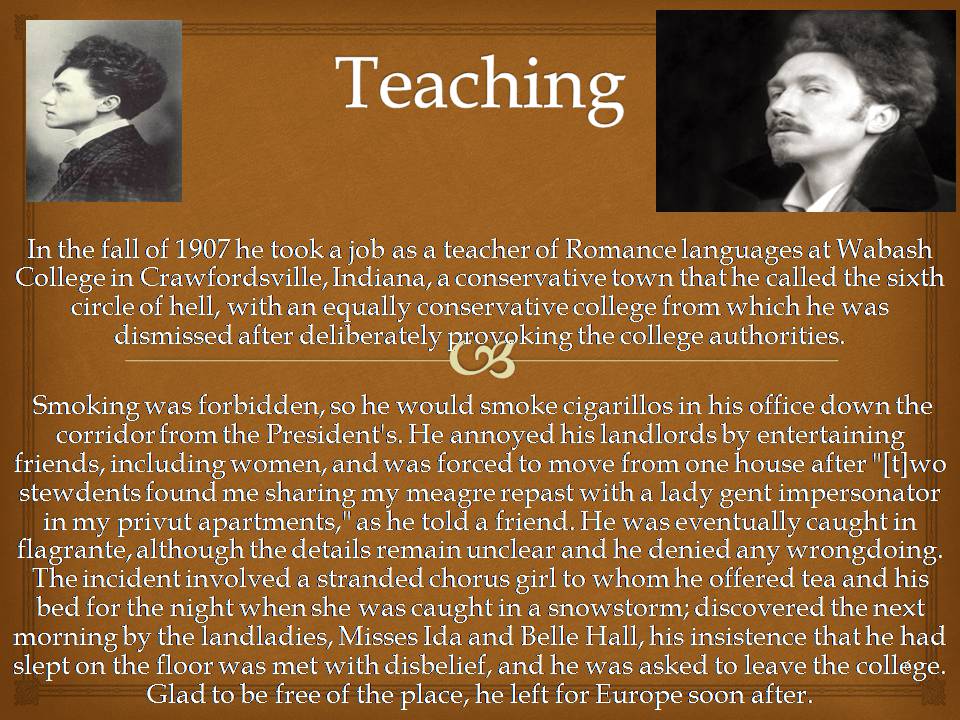
Слайд #7
7
First World War, disillusionment
Between 1914 and 1916 he helped to have James Joyce's A Portrait of the Artist as a Young Man serialized in The Egoist then published in book form, and he persuaded Poetry to publish T. S. Eliot's "The Love Song of J. Alfred Prufrock" in June 1915. Conrad Aiken writes that he had shown "Prufrock" to every conceivable editor in England, but it was dismissed as crazy. He eventually sent it to Pound who, Aiken writes, instantly saw that it was a work of genius and sent it to Poetry. "[Eliot] has actually trained himself AND modernized himself ON HIS OWN," Pound wrote to Monroe in October 1914. "The rest of the promising young have done one or the other but never both. Most of the swine have done neither."
First World War, disillusionment
Between 1914 and 1916 he helped to have James Joyce's A Portrait of the Artist as a Young Man serialized in The Egoist then published in book form, and he persuaded Poetry to publish T. S. Eliot's "The Love Song of J. Alfred Prufrock" in June 1915. Conrad Aiken writes that he had shown "Prufrock" to every conceivable editor in England, but it was dismissed as crazy. He eventually sent it to Pound who, Aiken writes, instantly saw that it was a work of genius and sent it to Poetry. "[Eliot] has actually trained himself AND modernized himself ON HIS OWN," Pound wrote to Monroe in October 1914. "The rest of the promising young have done one or the other but never both. Most of the swine have done neither."
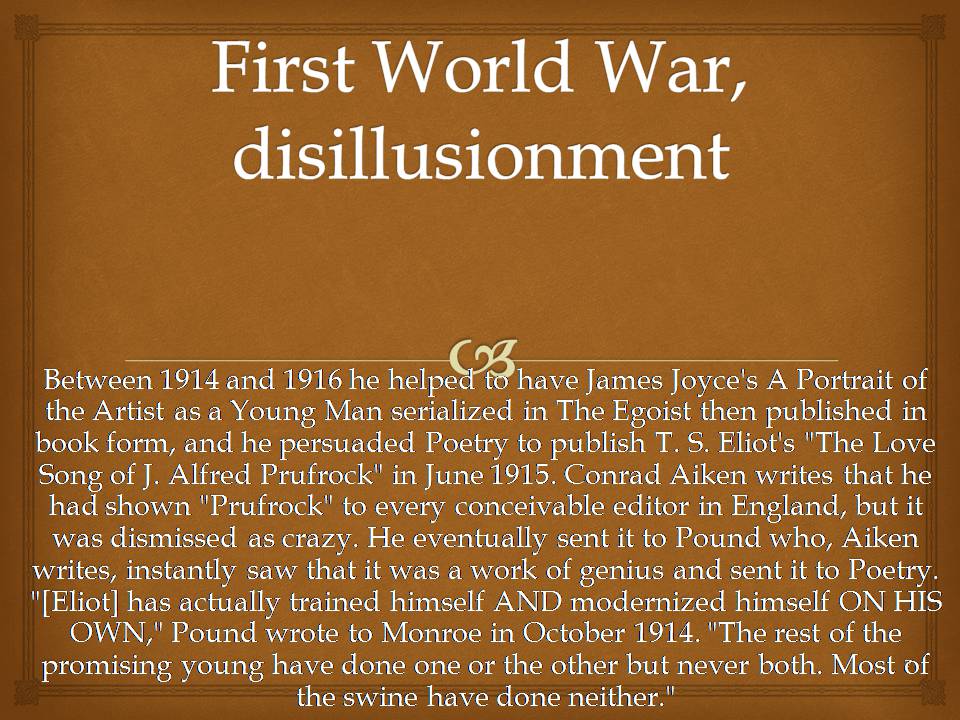
Слайд #8
8
Translations
Pound's Fenollosa translations, unlike previous American translators of Chinese poetry, who tended to work with strict metrical and stanzaic patterns, Pound created free verse translations. Whether the poems are valuable as translations continues to be a source of controversy. Pound scholar Ming Xie explains that the use of language in Pound's translation of the Old English poem "The Seafarer" is deliberate, avoiding merely "trying to assimilate the original into contemporary language". After his work with The Seafarer, it was in the Japanese Noh plays that he found an answer to his search for anti-naturalist minimalism which occurred just prior to his initial work with Fenellosa's papers, leading to the translation of 14 Chinese poems in Cathay, published in 1915.
Translations
Pound's Fenollosa translations, unlike previous American translators of Chinese poetry, who tended to work with strict metrical and stanzaic patterns, Pound created free verse translations. Whether the poems are valuable as translations continues to be a source of controversy. Pound scholar Ming Xie explains that the use of language in Pound's translation of the Old English poem "The Seafarer" is deliberate, avoiding merely "trying to assimilate the original into contemporary language". After his work with The Seafarer, it was in the Japanese Noh plays that he found an answer to his search for anti-naturalist minimalism which occurred just prior to his initial work with Fenellosa's papers, leading to the translation of 14 Chinese poems in Cathay, published in 1915.
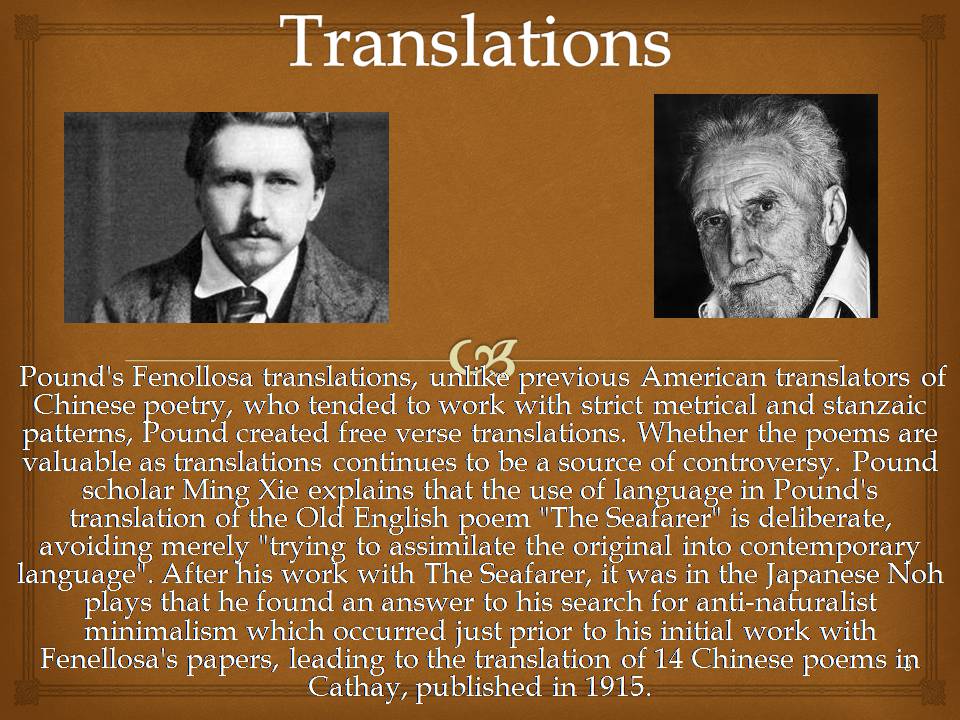
Слайд #9
9
The Homer Pound House, Ezra's birthplace in Hailey, Idaho, survives and is listed on the U.S. National Register of Historic Places.
The Homer Pound House, Ezra's birthplace in Hailey, Idaho, survives and is listed on the U.S. National Register of Historic Places.
